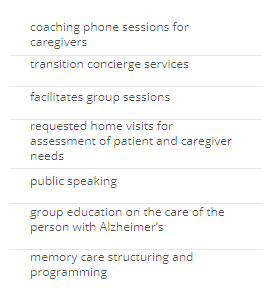
Reasons why Alzheimer’s patients behave certain ways that impact the caregivers.
Why are you acting this way?
As your Alzheimer’s loved one passes through the stages, you will most likely notice personality and behavior changes. Some of these changes could be shocking to you because you know that your mom or dad would never say that or never do that.
Some, but not all persons with Alzheimer’s can display the following behavior:
- Screaming, yelling or arguing for no apparent reason
- Striking and hitting the caregiver
- Cursing and saying mean, socially unacceptable or hurtful words or statements.
- Noncompliance with care in general
- Sexual inappropriateness
- Quickly pacing without redirection
- Throwing objects, food plates or medicine
- Crying uncontrollably
- Fidgeting and being in constant motion while sitting
- Urinate or defecate on the floor
No one knows for sure what happens inside the brain specifically to cause behavior outburst, but it is certainly being created by the changes taking place.
Know that, the person with Alzheimer’s loosing memory, sensibility, and cognition are leading way to displaying behaviors that appear unexplainable. The best thing that we can do is to recognize the following possible factors to foster understanding and interventions;
- The Alzheimer’s person cannot articulate if they have a head ache, are hungry, thirsty, have to use the bathroom, want to change their position, want to go home, have arthritis pain, tired, frustrated, uncomfortable, and the list of feelings and emotions goes on and on.
- The Alzheimer’s person could be having medication side effects.
- The Alzheimer’s person could have sensory overload to increased questions, hot, cold, and noises,
- The Alzheimer’s person could be suffering from a urinary tract infection.
- The Alzheimer’s person may know that they cannot articulate what they want to say creating extreme frustration.
- Too much activity around the Alzheimer’s person, such as: construction outside, someone mowing the lawn, children crying or talking loudly, the vacuum sweeper, or even a casual conversation between two people that the Alzheimer’s person overhears but can’t appropriately respond too.
- The Alzheimer’s person may think that they have to go to work or have somewhere to be and they are unable to fulfill the task of getting there.
- The Alzheimer’s person could be worried about children, perceiving their own children as being young.
- Wanting to see their mom, dad, brother and forgetting that they have passed away. Or having thoughts of where they could be.
- The Alzheimer’s person could be having long term memories of unpleasant events or feeling as if those memories are reality now.
- Possible hallucinations or delusions are creating a fictitious reality for the Alzheimer’s person.
- Feelings of depression are not uncommon for the Alzheimer’s person creating symptoms associated with depression.
It is important to rule out any factor that may be causing the behavior and perform an assessment to achieve a possible indication. Interventions to stop unwanted behavior
Intervening with Unwanted behavior
There are many theories about creating a calm and comfortable environment for the Alzheimer’s person. As many of them can work, it is essential to account for your loved ones own specific needs and be observant when an unwanted behavior is occurring, noticing activity prior to the episode. However, there can be times you will notice the behavior outburst occurs unsolicited. Do not argue with your person with Alzheimer’s or yell at them to stop. Always be aware that they are not in control of their emotions. The following are a list of interventions that you can use to forestall a behavior episode:
- Redirect to a quiet room, using a calm and peaceful voice.
- Use diversion by asking the person to show you something, or suddenly telling them about your day. Or setting pictures in front of them to look at.
- Play music that they once enjoyed or utube meditation music.
- Place a sweater or a blanket on your person or remove them.
- For fidgeting, place a blanket over their lap placing the corner of the blanket in their hand, give them a stuffed animal to hold, or a soft stress ball to hold.
- For pacing aimlessly, take them to the bathroom, offer a drink, escort them for a walk outside.
- Ask your loved one to perform a task for you such as folding cloths or sorting your silverware. Any activity that once was a lifelong activity is sometimes easily remembered and can be enjoyed.
- Ensure that your Physician reviews medication prescribed, often times as a person progresses through Alzheimer’s, medications that they may have been on for a long time are no longer needed. Or new medications can create unexpected side effects.
- Always offer a drink or something to eat. If your loved one liked cookies, offer one by just handing it to them without a choice.
- Ask your person to sit down and tell them you are going to rub their back, if they in fact comply, perform the message. Never force someone to do this though.
- Start telling your loved one a story that they once loved to hear or talking about where they lived as a child.
- If your person is use to taking an other the counter analgesic, as in Tylenol or Advil, offer it to them now. (Ensure that you are comfortable doing this, and that the Physician is aware)
- Ask your person if they hurt somewhere. Maybe an old arthritis pain has flared up.
- Remove anything or anyone creating loud noises or chaos around your person
- If your loved one is hitting you, ensure their safety and back away. Tell them that you will help them later and reproach when calm.
- If urinating or defecating on the floor, set up a toileting routine, generally every two hours.
- If your person is hallucinating, maybe says they saw someone come in, or someone took something of theirs. Simply reassure them that all is ok now, or that you will look into it.
- Try essential oils, for instance: Mandarin is for calming, Jasmine is sedative, Bergamot is relaxing, lavender is anti-anxiety.
- Ask your Physcian about incorporating Melatonin prior to your love one going to bed to help with sleep cycle and promote adequate rest.
- Offer your loved one to lay back in a reclining chair or on the bed for a nap
- Give your loved one magazines to look at of once desired products or publications.
- Offer safe tools to fix something , which may allow them to feel productive.
- If shoes are on, offer to remove them and place slippers on their feet for a sensory change. This can also include changing a shirt, pants or socks.
- Rub lotion on their hands or feet and talk while you are doing it.
- If your person is uncontrollably violent, remove yourself immediately and call for help




